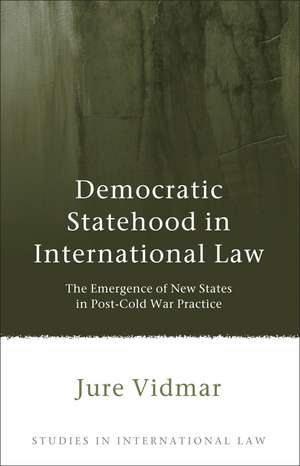Democratic Statehood in International Law: The Emergence of New States in Post-Cold War Practice: Studies in International Law
Autor Jure Vidmaren Limba Engleză Hardback – 27 mar 2013
Din seria Studies in International Law
- 34%
 Preț: 511.07 lei
Preț: 511.07 lei - 30%
 Preț: 538.77 lei
Preț: 538.77 lei - 23%
 Preț: 249.26 lei
Preț: 249.26 lei - 34%
 Preț: 512.30 lei
Preț: 512.30 lei - 21%
 Preț: 275.26 lei
Preț: 275.26 lei - 30%
 Preț: 570.51 lei
Preț: 570.51 lei - 30%
 Preț: 571.24 lei
Preț: 571.24 lei - 30%
 Preț: 598.45 lei
Preț: 598.45 lei - 18%
 Preț: 297.20 lei
Preț: 297.20 lei - 30%
 Preț: 573.05 lei
Preț: 573.05 lei - 30%
 Preț: 1138.79 lei
Preț: 1138.79 lei -
 Preț: 448.39 lei
Preț: 448.39 lei - 30%
 Preț: 571.34 lei
Preț: 571.34 lei - 28%
 Preț: 406.31 lei
Preț: 406.31 lei - 21%
 Preț: 270.97 lei
Preț: 270.97 lei - 30%
 Preț: 570.43 lei
Preț: 570.43 lei - 30%
 Preț: 836.82 lei
Preț: 836.82 lei - 14%
 Preț: 570.43 lei
Preț: 570.43 lei - 30%
 Preț: 512.37 lei
Preț: 512.37 lei - 30%
 Preț: 511.14 lei
Preț: 511.14 lei - 30%
 Preț: 954.11 lei
Preț: 954.11 lei - 30%
 Preț: 572.47 lei
Preț: 572.47 lei - 30%
 Preț: 603.73 lei
Preț: 603.73 lei - 30%
 Preț: 779.50 lei
Preț: 779.50 lei - 14%
 Preț: 837.54 lei
Preț: 837.54 lei - 30%
 Preț: 898.78 lei
Preț: 898.78 lei - 30%
 Preț: 576.40 lei
Preț: 576.40 lei - 30%
 Preț: 719.91 lei
Preț: 719.91 lei - 12%
 Preț: 233.46 lei
Preț: 233.46 lei - 30%
 Preț: 779.50 lei
Preț: 779.50 lei - 30%
 Preț: 570.43 lei
Preț: 570.43 lei - 14%
 Preț: 779.09 lei
Preț: 779.09 lei - 30%
 Preț: 540.38 lei
Preț: 540.38 lei - 30%
 Preț: 573.86 lei
Preț: 573.86 lei - 14%
 Preț: 574.92 lei
Preț: 574.92 lei - 28%
 Preț: 500.25 lei
Preț: 500.25 lei - 30%
 Preț: 542.02 lei
Preț: 542.02 lei - 30%
 Preț: 778.12 lei
Preț: 778.12 lei - 30%
 Preț: 540.48 lei
Preț: 540.48 lei - 30%
 Preț: 570.43 lei
Preț: 570.43 lei - 30%
 Preț: 515.24 lei
Preț: 515.24 lei - 30%
 Preț: 573.70 lei
Preț: 573.70 lei - 30%
 Preț: 720.23 lei
Preț: 720.23 lei - 30%
 Preț: 784.00 lei
Preț: 784.00 lei - 22%
 Preț: 571.24 lei
Preț: 571.24 lei - 14%
 Preț: 779.09 lei
Preț: 779.09 lei - 30%
 Preț: 779.91 lei
Preț: 779.91 lei
Preț: 599.66 lei
Preț vechi: 859.30 lei
-30% Nou
Puncte Express: 899
Preț estimativ în valută:
114.76€ • 119.37$ • 94.74£
114.76€ • 119.37$ • 94.74£
Carte tipărită la comandă
Livrare economică 14-28 aprilie
Preluare comenzi: 021 569.72.76
Specificații
ISBN-13: 9781849464697
ISBN-10: 1849464693
Pagini: 302
Ilustrații: black & white illustrations
Dimensiuni: 156 x 234 x 18 mm
Greutate: 0.59 kg
Ediția:New.
Editura: Bloomsbury Publishing
Colecția Hart Publishing
Seria Studies in International Law
Locul publicării:London, United Kingdom
ISBN-10: 1849464693
Pagini: 302
Ilustrații: black & white illustrations
Dimensiuni: 156 x 234 x 18 mm
Greutate: 0.59 kg
Ediția:New.
Editura: Bloomsbury Publishing
Colecția Hart Publishing
Seria Studies in International Law
Locul publicării:London, United Kingdom
Caracteristici
This book analyses the emerging practice in the post-Cold War era of the creation of a democratic political system along with the creation of new states.The book fills a gap in the literature by demonstrating that via the right of self-determination the law of statehood requires for state creation to be a democratic process, but that this requirement should not be interpreted too broadly.The book will be of interest to both scholars and practitioners of international law.
Notă biografică
Jure Vidmar is a Leverhulme Early Career Fellow in the Faculty of Law and a Research Fellow of St John's College, University of Oxford.
Cuprins
Chapter 1 Democracy and Statehood in International Law 1 Introduction 2 International Law and (Non-)democratic States 3 The Emergence of States in International Law Chapter 2 The Practice of Post-Cold War State Creations: The Statehood Criteria, Democracy and Human Rights 1 Introduction 2 The Emergence of States as a Result of Domestic Consensus 3 The EC Guidelines and EC Declaration: Beyond the Statehood Criteria 4 The Independence of Montenegro 5 International State-making and Democracy-making in East Timor 6 Kosovo as an Attempt at Informal Collective Creation of a Democratic State 7 Conclusion Chapter 3 Democratic Aspects of the Right of Self-Determination 1 Introduction 2 Self-determination: Development, Democratic Pedigree and Limitations 3 Self-determination, Governmental Representativeness and Multiparty Democracy 4 The Right of Self-determination, Political Participation and Choice of Political System 5 Democracy and the exercise of the Right of Self-determination in its Internal Mode 6 The 'Safeguard Clause' and Remedial Secession 7 Democratic Principles and External Exercise of the Right of Self-determination 8 Conclusion Chapter 4 Delimitation of New States and Limitations on the Will of the People 1 Introduction 2 The Creation of New States and the Uti Possidetis Principle 3 The Nature and Relevance of Internal Boundaries in the Post-1990 Practice of New International Delimitation 4 Conclusion Chapter 5 Democratic Statehood: Conclusions 1 Democracy and Statehood: An Analysis from Two Perspectives 2 The Emergence of New States in the Post-Cold War Practice 3 Contemporary International Practice and the Legal Status of the Statehood Criteria 4 The Operation of and Limits on Democratic Principles Within the Right of Self-Determination 5 Final Remarks: The Place of Democracy within the Process of State Creation
Recenzii
..up-to-date, systematic and authoritative coverage of state creation and recognition in the international order. The book caps its author's series of substantial contributions to the literature on this topic.
Descriere
This book analyses the emerging practice in the post-Cold War era of the creation of a democratic political system along with the creation of new states.
